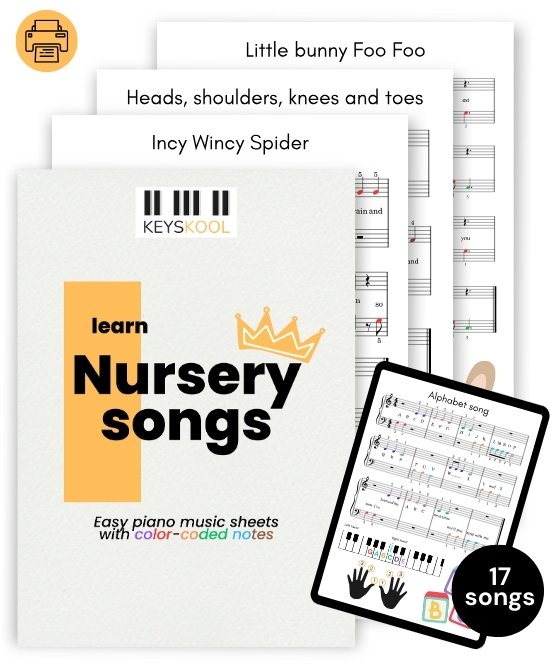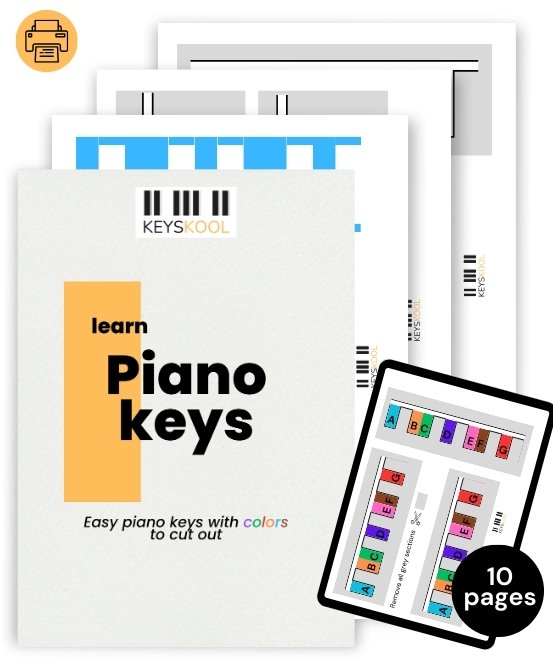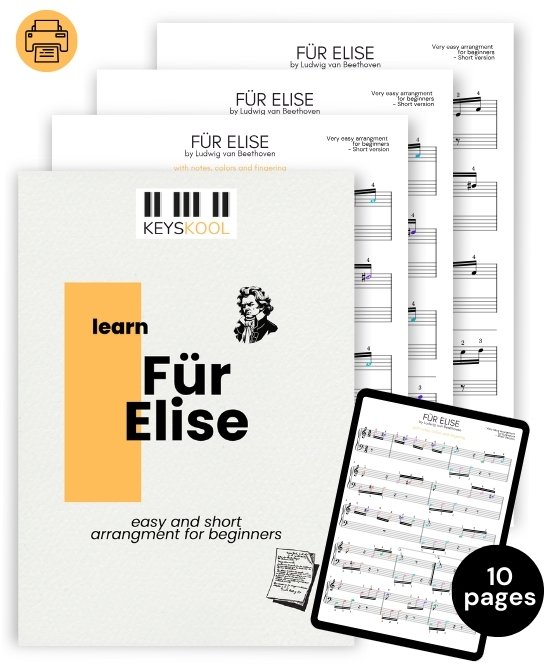Starting your piano journey can be both exciting and a little daunting, especially if you’re a young beginner. But don’t worry, we’re here to make it easier for you! We’ve put together a selection of 17 very easy nursery songs, perfect for 8-year-olds just starting out on their musical journey. These delightful piano songs for 8 year olds are not only fun to play but also a great way to learn the basics. We invite you to download the PDF and start playing these songs. So, let’s dive into the world of music and unleash the pianist within you!
Choosing piano songs for 8 year olds to Start Playing the Piano
Starting to learn the piano can be both exciting and overwhelming for beginners, especially for children. Choosing the right songs to start with can make a significant difference in their learning journey.
Nursery songs are a great choice for children who are just starting to play the piano. These songs are typically simple, easy to remember, and fun to play. They allow children to feel accomplished and motivated to continue learning.
When choosing nursery songs for your child, consider their interests, musical preferences, and learning pace. Songs like “Twinkle Twinkle Little Star”, “Mary Had a Little Lamb”, and “The Alphabet Song” are excellent choices for beginners. These songs have simple melodies and are easy to play.
Remember, the goal is to make the learning process enjoyable and engaging for your child. So, don’t rush them. Let them take their time to learn each song and celebrate their progress along the way.
Happy playing!

Printable piano nursery songs easy for beginners PDF
The easiest method to play your first nursery song on the piano with the color-codes notes and keys and fingering.
Emotional Skills: Learning and playing music can help children understand their emotions better. This is especially true for nursery songs, which often convey simple emotions that children can relate to (Source: “The Role of Music in Children’s Lives: Social and Emotional Benefits”, Hallam, 2010).
A selection of 17 piano songs for 8 year olds
| Song | Piano Level of Practice | Appropriate Age | Notes Used | Fingers Righ Hand | Fingers Left Hand |
|---|---|---|---|---|---|
| The Alphabet song | Beginner | 5-6 | C, D, E, G, A, B | 1, 2, 3 | 3, 2, 1 |
| Little Bunny Foo Foo | Beginner | 5-6 | C, D, E, G, B | 1, 2, 3, | 5, 4, 1 |
| Mary Had a Little Lamb | Beginner | 5-6 | C, E, F, G, A | 1, 2, 3, 5 | 4, 3, 1 |
| Do Your Ears Hang Low | Beginner | 6-7 | C, D, E, F, G, A | 1, 2, 3 | 4, 3, 2, 1 |
| Baa Baa Black Sheep | Beginner | 5-6 | C, D, E, G, A, B | 1, 2, 3, 4, 5 | 3, 2, 1 |
| Heads, Shoulders, Knees, Toes | Beginner | 5-6 | C, D, E, G, A, B♭ | 1, 2, 3, 4, 5 | 4, 3, 2, 1 |
| Incy Wincy Spider | Beginner | 6-7 | C, D, E, F, G, A | 1, 2, 3, 4, 5 | 5, 2, 1 |
| Humpty Dumpty | Beginner | 6-7 | C, D, E, F, G, A, B | 1, 2, 3, 4, 5 | 5, 2, 1 |
| Hey Diddle Diddle | Beginner | 5-6 | C, D, E, F, G, A, B | 1, 2, 3, 4, 5 | 4, 1 |
| Hickory, Dickory Dock | Beginner | 6-7 | C, D, E, F, G, A, B | 1, 2, 3, 4, 5 | 4, 3, 2, 1 |
| London Bridge | Beginner | 6-7 | C, D, E, F, G, A, B | 1, 2, 3, 4, 5 | 5, 1 |
| Row Row Row Your Boat | Beginner | 5-6 | C, D, E, F, G | 1, 2, 3, 4, 5 | 5, 1 |
| The Wheels on the Bus | Beginner | 6-7 | C, E, F, G, A | 1, 2, 3, 4, 5 | 5, 4, 1 |
| Oranges and Lemons | Beginner | 6-7 | C, D, G, A, B | 1, 2, 3, 4, 5 | 5, 2, 1 |
| Oh Dear, What Can the Matter Be | Beginner | 6-7 | C, D, E, F, G, A | 1, 2, 3, 4, 5 | 5, 2, 1 |
| Yankee Doodle | Beginner | 5-6 | C, D, E, F, G, A, B | 1, 2, 3, 4, 5 | 5, 4, 3, 2, 1 |
| Twinkle, Twinkle, Little Star | Beginner | 5-6 | C, D, E, F, G, A, B | 1, 2, 3, 4, 5 | 5, 4, 3, 2, 1 |

Twinkle, Twinkle, Little Star
Twinkle, Twinkle, Little Star is a popular English lullaby. The lyrics are from an early 19th-century English poem by Jane Taylor, “The Star”. The poem, which is in couplet form, was first published in 1806.
This song is perfect for young beginners because of its repetitive melody and simple rhythm. I
Yankee Doodle
Yankee Doodle is a well-known American song that originated in the 18th century and is often associated with the American Revolution. Its catchy and simple melody makes it easy for children to play.
The consistent rhythm and repetitive tune make it an excellent choice for beginners.
Oh Dear, What Can the Matter Be
Oh Dear, What Can the Matter Be is an old traditional English nursery rhyme that was first recorded in 1795. It’s a good choice for beginners due to its simple melody.
The rhythm is simple and consistent, making it easy for beginners to pick up.
Oranges and Lemons
Oranges and Lemons is a traditional English nursery rhyme and singing game which refers to the bells of several churches, all within or close to the City of London. It was first recorded in 1665.
The rhythm is simple, and the melody is repetitive, making it a great choice for young children just starting to learn the piano.
The Wheels on the Bus
The Wheels on the Bus is a popular children’s song in the United States, Canada, the United Kingdom, and Australia, often sung in preschools and nurseries. It was first recorded in 1939.
Its repetitive melody and rhythm make it easy for beginners to learn and remember.
Row Row Row Your Boat
Row Row Row Your Boat is another popular English nursery rhyme and a great song for children. It was first recorded in 1852. The song has a simple, catchy, and rhythmic tune that makes it easy for beginner pianists.
London Bridge
London Bridge is a traditional English nursery rhyme and singing game, which is found in different versions all over the world. It dates back to at least the 17th century.
The melody is simple and repetitive, making it a good choice for beginners.
Hickory, Dickory Dock
Hickory, Dickory Dock is a traditional nursery rhyme, first recorded in England in 1744. The song uses a small range of notes and a simple, repetitive melody, making it easy for beginners.

“I believe every child has the instinct to beat on a drum or to play a piano.”
– Billy Joel
Hey Diddle Diddle
Hey Diddle Diddle is an English nursery rhyme, first recorded in 1765. It’s a good choice for beginners because the melody is simple and repetitive, and it uses a small range of notes.
Humpty Dumpty
Humpty Dumpty is a traditional nursery rhyme, first recorded in England in 1797. The song uses a small range of notes and a simple, repetitive melody, making it easy for beginners.
Incy Wincy Spider
Incy Wincy Spider, also known as Itsy Bitsy Spider or Eency Weency Spider, is a popular nursery rhyme and fingerplay. The song’s origin is unknown, but it was first published in 1920. It is a great choice for beginners because of its repetitive melody and small range of notes.
Heads, Shoulders, Knees and Toes
Heads, Shoulders, Knees and Toes is a children’s song of unknown origin, designed to teach children about body parts. It uses a small range of notes and a simple, repetitive melody, making it easy for beginners.
Baa Baa Black Sheep
Baa Baa Black Sheep is an English nursery rhyme dating back to the Middle Ages. It’s a good choice for beginners because the melody is simple and repetitive, and it uses a small range of notes.
Do Your Ears Hang Low
Do Your Ears Hang Low is a traditional children’s song of unknown origin. It’s a simple and fun tune for beginners, using a small range of notes and a simple rhythm.
Mary Had a Little Lamb
Mary Had a Little Lamb is one of the most recognizable nursery rhymes, first published in 1830 by Sarah Josepha Hale.
The melody is repetitive and the rhythm is simple, mostly consisting of quarter notes.
Little Bunny Foo Foo
Little Bunny Foo Foo is a popular children’s poem. It’s origin is not concrete but it has been a part of children’s folklore for several decades.
This song is suitable for beginner pianists due to its simple melody and repetitive rhythm.
The Alphabet Song
The Alphabet Song is a classic song used worldwide to teach children the English alphabet. Its melody is derived from the French song “Ah! vous dirai-je, maman,” which was popularized by Mozart for his twelve variations on the theme.
The song is perfect for beginners because of its repetitive melody and simple rhythm.
Encouraging Your Child to Start Playing the Piano: A Parent’s Guide
Playing the piano can be a wonderful journey of musical discovery for your child. As a parent, you play a crucial role in nurturing your child’s interest and guiding them along the way. Here are some friendly and encouraging tips to help you support your child as they embark on their piano-playing adventure.
Make It Fun
The first rule of thumb is to make sure that your child enjoys the process. Turn practice sessions into a fun activity rather than a chore. You could create a game out of it, have friendly competitions, or even reward them for reaching specific milestones.

Create a Positive Learning Environment
Set up a comfortable space for your child’s practice sessions. Ensure that the area is quiet, well-lit, and free from distractions. A positive learning environment can significantly enhance your child’s focus and engagement.
Be Patient
Learning to play the piano is a journey that takes time. Your child may not pick up everything immediately, and that’s okay. Be patient, and reassure them that it’s okay to make mistakes. Remember, progress, not perfection, is the goal.
Encourage Regular Practice of piano songs for 8 year olds
Regular practice is crucial for mastering the piano. However, it’s important not to push your child too hard. Encourage them to practice regularly but allow them to take breaks when needed. Remember, the goal is to foster a love for piano, not to create stress.
Celebrate Small Wins
Each time your child learns a new note, masters a scale, or plays a song correctly, celebrate it. These little victories will boost their confidence and motivate them to keep going.
Show Interest
Show interest in your child’s piano playing journey. Listen to them play, ask them about what they’re learning, and attend their recitals. Your support will mean a lot to them.
Remember, every child is unique, and what works for one may not work for another. The key is to be patient, supportive, and encouraging as your child finds their rhythm. Happy playing!
In conclusion, finding the right piano songs for 8 year olds can make their learning journey enjoyable and fruitful. Start with simple nursery rhymes and gradually introduce more complex melodies. Most importantly, ensure the process is fun, engaging, and in line with their interests and pace. Happy playing!


